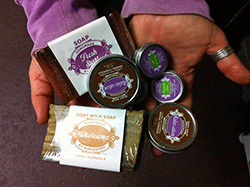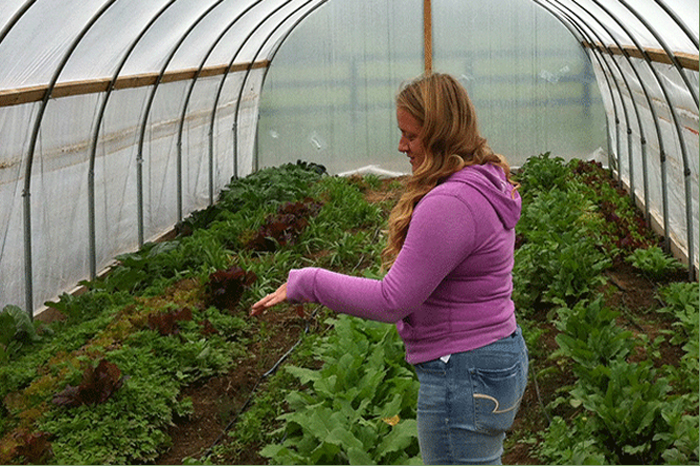Many survivors of domestic violence have had their attempts at work and creativity sabotaged for years. On these 40 acres of rolling farmland, they’re being restored.
As mist hovers over the rolling fields of Kentucky and the sun is still low in the sky, the women of Greenhouse 17 emerge from the house they share, clippers in hand. They spread out over a field and cut bouquets of fresh flowers.
“I came out here, and I was able to let my mind go.”
The small farm and business on a 40-acre site outside Lexington, Kentucky, provides the women with both shelter and employment, giving them a chance to gain skills, confidence, and a renewed sense of self-worth. Residents grow vegetables, herbs, and flowers and sell them to the public through a community-supported agriculture program. The vegetables also supply the shelter’s kitchen. And in a commercial kitchen adjacent to the farm, the women dry the herbs, preserve vegetables, and make soaps and balms, which they sell online under the brand “Handmade by Survivors.” These early mornings are a favorite time for staff farm manager Jessica Ballard. She says harvesting and arranging fresh flowers is a healing balm for the domestic violence survivors who live here. Their shelter, one of Kentucky’s beautiful old rambling country homes, changed its name from the Bluegrass Domestic Violence Program to Greenhouse 17 in 2013 to reflect the nonprofit’s newfound focus on farming. It houses women from 17 counties in Kentucky, many of whom have fled isolation and violence, bringing their children and little else.

The women of Greenhouse 17 grow flowers and herbs that they use to make soaps and other products.
Domestic violence is widespread nationwide, with one in three women abused by an intimate partner at some point in her life. “For many of them, their abuser had sabotaged their attempts to work,” Ballard says. “They weren’t allowed to be creative. They were told they were stupid.”
Not all the women take to farm work, Ballard admits. Some prefer to sit on the porch and smoke cigarettes. But residents receive a stipend for their work, and those who choose to work often get hooked. “They are experiencing nature, getting up every morning, and getting exercise,” Ballard says. “And they’re working together and creating something beautiful.”
The flowers have turned out to be a favorite for customers, too. Buyers from Lexington and other nearby communities sign up for weekly CSA bouquets and purchase arrangements for weddings and other special occasions.
“To work in the farm every day was a sense of accomplishment,” says Donna, a Greenhouse 17 resident, in a video posted on the shelter’s website. “I came out here, and I was able to let my mind go. I didn’t have to worry about the stresses that were on me. I was working … to feed the house and to help the other girls. I love helping people, and if I could help them more than myself, that was a good thing.”
The shift from shelter to farm has brought other changes also. The staff of Greenhouse 17 used to keep the shelter’s location a secret because of concerns for the women’s safety. But now, though there are security precautions, the public knows the farm’s location and people from the community come out to volunteer. The women love giving visitors tours, Ballard says. They get to show off their knowledge, and guests learn to know the residents.
“After what I went through … the farm has helped me realize that I can do it. I can start something and I can finish it,” Donna says. “I can watch something grow from the beginning stage to the end stage and see the result it has on everyone else.”
Source: Yes! Magazine
